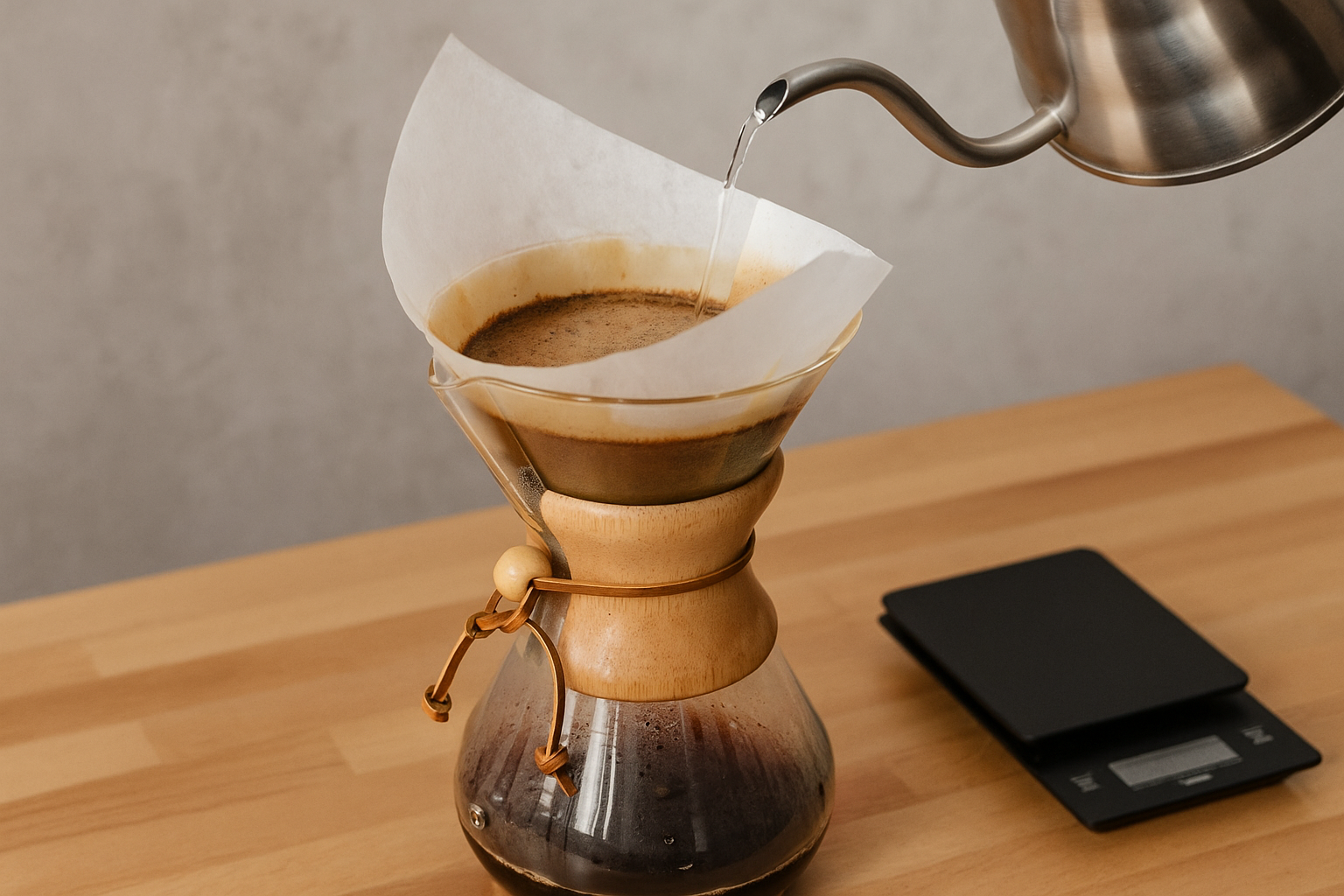The Chemex is one of the most iconic coffee brewers in the world. Recognized for its elegant hourglass shape and wooden collar, it’s more than just a design piece—it’s a tool for making clean, bright, and nuanced coffee.
Invented in the 1940s, the Chemex has remained a favorite for coffee lovers who appreciate both form and function.
But brewing with a Chemex isn’t quite the same as with a standard pour-over dripper. It requires attention to detail, patience, and understanding how grind size, water flow, and filter design all work together to create that signature clarity.
In this guide, we’ll walk through everything you need to know about brewing coffee with a Chemex—from gear and technique to flavor tips and common mistakes.
What Is a Chemex?
The Chemex Coffeemaker was invented in 1941 by Dr. Peter Schlumbohm, a chemist who believed scientific principles could be applied to make better coffee. The brewer is made of borosilicate glass and uses proprietary thick paper filters that remove oils and sediment.
Its aesthetic beauty earned it a permanent place in the Museum of Modern Art (MoMA)—but its ability to brew incredibly clean, flavorful coffee is what has kept it in kitchens and cafés for decades.
Why Use a Chemex?
- Exceptional clarity and brightness in the cup
- Brews multiple cups at once (great for sharing)
- Beautiful design doubles as kitchen décor
- Filters out oils and fines for a smooth mouthfeel
- Great for light to medium roast beans
The Chemex is especially loved by fans of floral, fruity, and complex coffees, as its thick filter removes heavier body elements, highlighting delicate flavors.
Equipment and Ingredients
What You Need:
- Chemex (available in 3, 6, 8, or 10-cup sizes)
- Chemex paper filters (prefolded or unfolded square filters)
- Gooseneck kettle (for precise pouring)
- Burr grinder
- Fresh coffee beans
- Digital scale (highly recommended)
- Timer
Recommended Coffee Ratio:
- 1:15 to 1:17 ratio (e.g., 30g coffee to 450–510g water)
- Use more coffee for stronger brews, less for lighter ones
Grind Size:
- Medium-coarse grind—similar to kosher salt
- Too fine = slow drawdown, over-extraction
- Too coarse = weak, under-extracted coffee
How to Brew with a Chemex: Step-by-Step
Step 1: Boil Water
Bring water to about 200°F (93°C). Use filtered water for best taste. You’ll need around 500g (ml) of water for a standard 2–3 cup brew.
Step 2: Fold and Rinse Filter
If using unfolded square filters:
- Fold into a cone shape
- Place the triple-layered side over the spout (to prevent collapse)
Rinse thoroughly with hot water to:
- Remove paper taste
- Preheat the brewer
Discard rinse water through the spout.
Step 3: Add Ground Coffee
Add 30g of medium-coarse coffee into the center of the filter. Tap gently to level the bed for even extraction.
Step 4: Bloom
Start timer. Pour 60g of hot water in slow, circular motion to saturate all grounds. Let bloom for 30–45 seconds.
This releases CO₂ from freshly ground coffee, allowing better extraction.
Step 5: Main Pour
After the bloom, pour water slowly in concentric circles, avoiding the sides. Keep the water level steady and centered.
Pour in 3 to 4 stages, allowing water to drain slightly between each pour.
Total water added should be around 450–500g, depending on your ratio.
Step 6: Let It Drain
Allow all water to drain through the grounds. The drawdown should take 3.5 to 5 minutes in total (including bloom). If it’s faster or slower, adjust your grind size next time.
Step 7: Remove Filter and Serve
Carefully remove the filter and discard. Swirl the Chemex gently to mix the brew evenly, then pour and enjoy.
Flavor Profile of Chemex Coffee
| Characteristic | Chemex Result |
|---|---|
| Body | Light to medium |
| Acidity | Bright, crisp |
| Aroma | Pronounced floral and fruity notes |
| Mouthfeel | Clean, smooth |
| Sweetness | Balanced, subtle |
Because of the thick paper filter, Chemex coffee is clearer and cleaner than French Press or standard drip, and often preferred by those who love light roast beans with intricate flavors.
Troubleshooting Common Issues
| Problem | Likely Cause | Solution |
|---|---|---|
| Bitter or dry flavor | Too fine grind, long brew | Grind coarser or reduce brew time |
| Sour or weak coffee | Too coarse grind, too fast drain | Grind finer, increase contact time |
| Brew takes too long | Too fine grind, slow pour | Use coarser grind or faster pour |
| Coffee overflows | Filter not positioned correctly | Triple layer over spout |
| Paper taste in coffee | Didn’t rinse filter | Always rinse before brewing |
Tips for Better Chemex Brewing
- Use fresh, high-quality beans: Lighter roasts with fruity or floral notes work best.
- Control your pour: A gooseneck kettle helps with slow, even pouring.
- Use a scale: Precision matters for consistency.
- Keep water just off the boil: Don’t scald the grounds.
- Swirl before serving: Mix the brew for even flavor.
Chemex vs Other Pour-Over Methods
| Method | Filter Type | Flavor Profile | Brew Time | Cup Size |
|---|---|---|---|---|
| Chemex | Thick paper | Clean, delicate, light | 4–5 mins | 2–6 cups |
| Hario V60 | Thin paper | Bright, complex | 2–3 mins | 1–2 cups |
| Kalita Wave | Flat-bottom paper | Balanced, consistent | 3–4 mins | 1–2 cups |
The Chemex is ideal when brewing for multiple people and when you want a crisp, refined cup that highlights high-quality beans.
Chemex Maintenance and Care
- Rinse with warm water after each use
- Avoid soap unless necessary—can cling to glass
- Use a bottle brush to clean inside the neck
- For deep cleans, soak with vinegar and baking soda
- Do not put wooden collar in dishwasher
Final Thoughts: A Brewing Method for the Curious and the Elegant
The Chemex isn’t just a pretty face. It’s a functional work of art that delivers a distinctive brewing experience and a clean, flavorful cup. While it requires attention to detail, the reward is coffee that showcases origin, roast, and freshness in a way few other brewers can.
If you love the process of making coffee as much as drinking it, and enjoy tasting the subtle differences between beans, the Chemex is the perfect tool for your journey. It’s part science, part ritual—and 100% worth the effort.

Marcelo Oliveira is a coffee enthusiast and content creator specializing in barista skills, brewing methods, equipment reviews, coffee-related health insights, and fascinating curiosities from the coffee world. With a deep passion for every step of the brewing process, he turns technical knowledge into accessible and engaging content for both beginners and seasoned coffee lovers. Marcelo’s goal is to help readers appreciate the full experience of coffee—from bean to cup.
